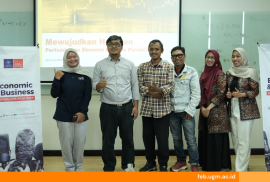On Friday (26/6), the Department of Accounting, Faculty of Economics and Business UGM collaborated with Indonesian Chartered Accountants (IAI) Chapter DI. Yogyakarta held a seminar titled “Financial and Accounting Systems for Health Institutions in New Normal Conditions”. This program was a response to the ongoing COVID-19 pandemic and the government policy that has begun to relax the implementation of large-scale social restrictions (PSBB). The policy must be accompanied by health protocols and system adjustments in health institutions.
In his remarks, Eko Suwardi, M.Sc., Ph.D. as the Dean of FEB UGM said that in the new normal era which was responded to by increasing health awareness, the business process at health institutions would be changed. A similar sentiment was also conveyed by Dr. Hardo Basuki as Chairperson of Indonesian Chartered Accountants (IAI) Chapter DI Yogyakarta, that health institutions must also make adjustments, including in accounting.
In the first session, Prof. Indra Bastian, MBA, CA, CMA, Ph.D. as the mediator of the Department of Accounting Universitas Gadjah Mada, discussed material related to institutionalizing accounting in Indonesian hospital practices. This is due to disagreements between health industry players, difficulties in using financial data, uncontrolled health financing deficits, and health organization disputes. As the frontline in health, health institutions have many stakeholders. Therefore, the accounting function plays a significant role in decision making.
The concept includes recognition, measurement, presentation to reporting. In its operation, health institutions refer to the Indonesian Hospital Accounting Guidelines (PARSI) which has the main duty in administering quality hospital accounting. Especially with the existence of the Social Security Organizing Agency (BPJS) demanding full accounting. Cost separation is needed in every case handling in the health agency.
In the second session, Dr. drg. Julita Hendrartini, M.Kes, AAK. as the Director of the Dental and Mouth Hospital of Universitas Gadjah Mada, explored more closely to the financing and financial system of the hospital in the new normal era. Julita said that currently the community was hit by the same storm, namely COVID-19. Looking at the current situation, COVID-19 is predicted to last for the next 18-24 months. This, of course, presents special challenges to health agencies. On the one hand, it must protect medical staff who work like dancing with death. On the other hand, it is also not allowed to harm the patient. This has the implications for hospital operating costs. Even though in this pandemic condition, the hospital fixed cost is huge.
The new normal era also presents its dilemmas for health institutions, for example, the cost of Personal Protective Equipment (PPE) that should not be charged to patients, the cost of screening patients, rates for the Indonesia Case Base Group (INA CBG) do not increase, and the scarcity of drugs and PPE. The establishment of INA-CBG tariffs not only uses data costing but also takes into account coding data related to actions. Data costing that can be used includes both macro costing and activity-based costing. Therefore, related to hospital funding, the government must focus on determining COVID referral hospitals. Besides, there is a need for refocusing and budget efficiency in each hospital.
In the next session, Drs. Haryono, Ak., M.Com as Director of Finance and General Administration of RSA UGM delivered material related to hospital financial management and accounting in the new normal era. He said that hospitals can utilize information systems-based financial management, as has been implemented at RSA UGM. Through this system, the submission of funds can be done online by using a tiered and integrated authorization. Thus, the financial management process, from planning to audit, can be run in one cycle in parallel.
Responding to the new normal, health institutions face various challenges, such as changes in the behavior of the hospital and patient community members, the use of technology in the socialization and marketing of hospital products, changes in service processes, and changes in leadership style. Therefore, modifications and changes to the systems and policies of health institutions are needed by utilizing information technology.
Translator: Laras OIA




